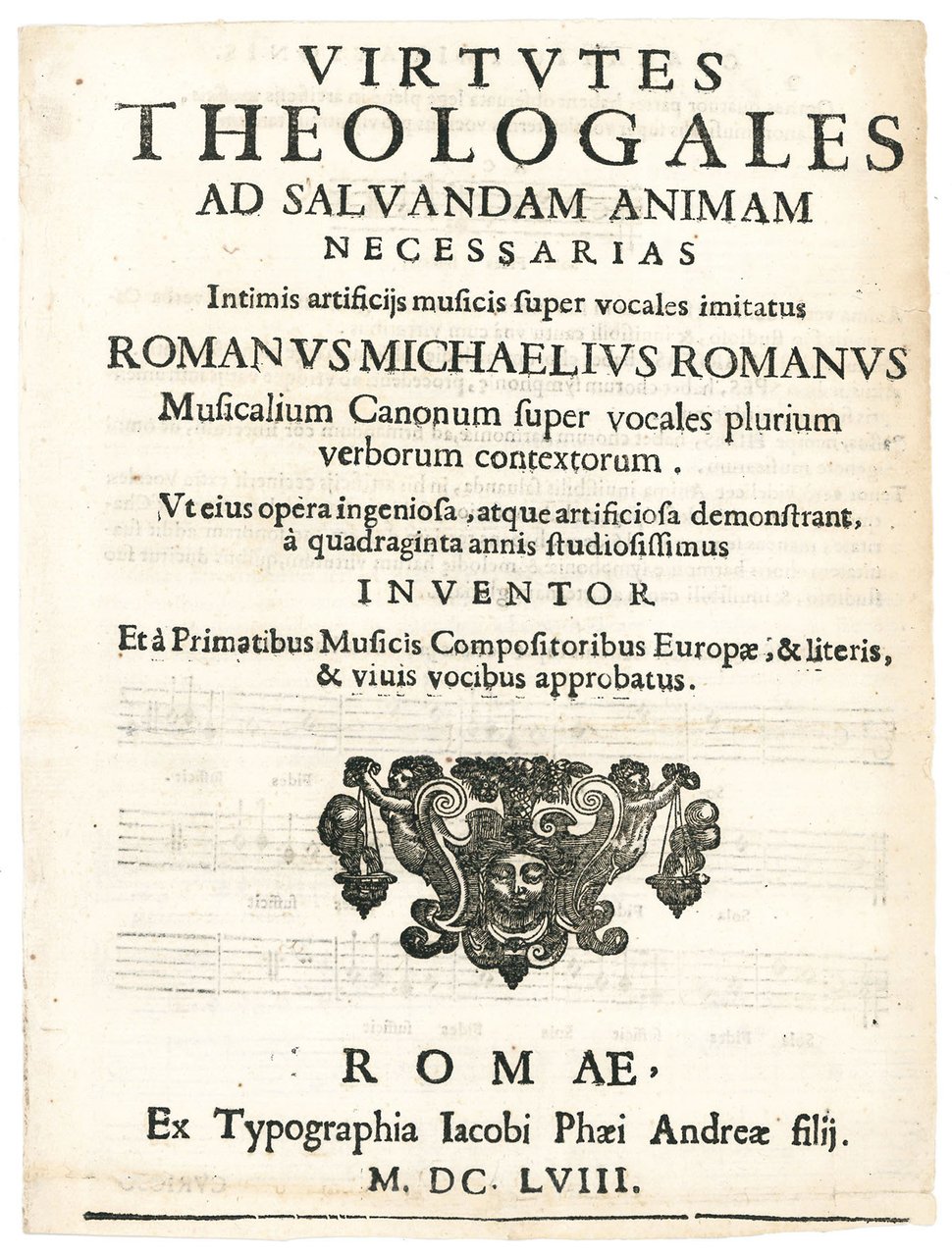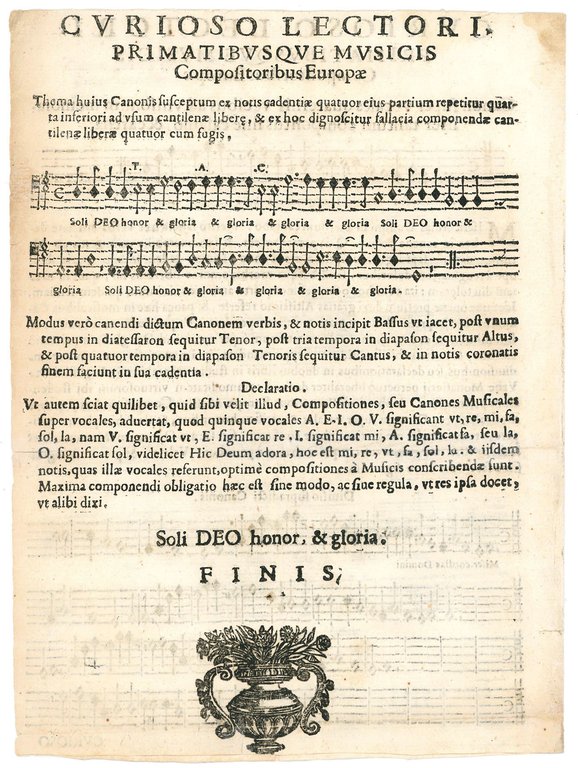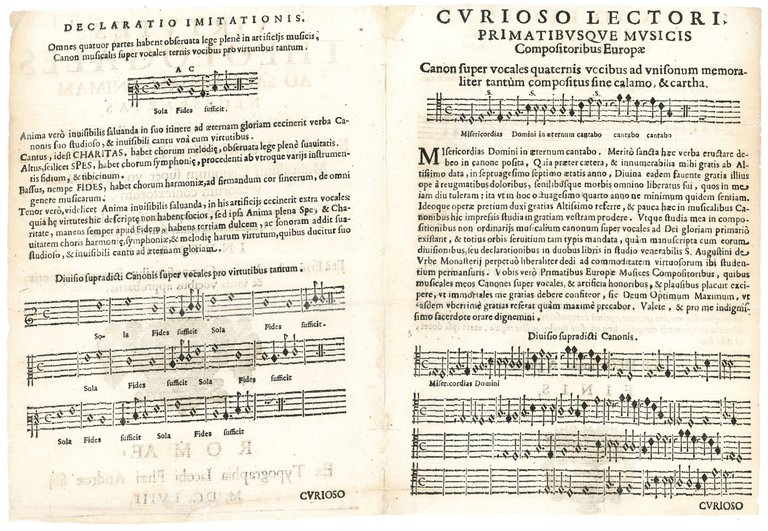


Livres anciens et modernes
MICHELI, Romano (ca. 1575-ca. 1659)
Virtutes theologales ad salvandam animam necessarias intimis artificys musicis super vocales imitatus Romanus Michaelius, Romanus musicalium canonum super vocales plurium verborum contextorum [...] inventor
Giacomo Fei, 1658
3900,00 €
Govi Libreria Antiquaria
(Modena, Italie)
Les frais d'expédition corrects sont calculés une fois que l'adresse de livraison a été indiquée lors de la création de la commande. Un ou plusieurs modes de livraison sont disponibles à la discrétion du vendeur : standard, express, economy, in store pick-up.
Conditions d'expédition de la Librairie:
Pour les articles dont le prix est supérieur à 300 euros, il est possible de demander un plan de paiement échelonné à Maremagnum. Le paiement peut être effectué avec Carta del Docente, Carta della cultura giovani e del merito, Public Administration.
Les délais de livraison sont estimés en fonction du temps d'expédition de la librairie et de la livraison par le transporteur. En cas de retenue douanière, des retards de livraison peuvent survenir. Les frais de douane éventuels sont à la charge du destinataire.
Pour plus d'informationsMode de Paiement
- PayPal
- Carte bancaire
- Virement bancaire
-
-
Découvrez comment utiliser
votre Carta del Docente -
Découvrez comment utiliser
votre Carta della cultura giovani e del merito
Détails
Description
Extremely rare first edition of this sort of musical testament by the composer Romano Micheli, in whose title he defines himself as “à primatibus musicis compositoribus Europae, & literis, & vivis vocibus approbatus” and in whose text he announces that he has donated his writings and compositions (both manuscript and printed) to the Augustinian monastery in Rome.
Published when the author was about 83 years old, the work appears as a kind of testimony that the old composer wanted to leave to posterity, claiming his own musical inventions (it is no coincidence that he calls himself “inventor” in the title), some of which were disputed during his lifetime, in particular his supremacy in the invention of canons over the vowels of certain words, an issue on which he had Marco Scacchi as his main opponent.
The booklet contains an example of a vocal canon composed on the vowels for three voices, each of which corresponds to a theological virtue (faith, hope, charity); a four-voice canon (Curioso lectori primatibusque musicis compositoribus Europae Canon super vocales quaternis vocis ad unisonum memoraliter tantum compositus sine calamo, & charta); and a free cantilena (Thema huius canonis susceptum ex notis cadentiae quatuor eius partium repetitur quarta inferiori ad usum cantilenae liberae [. .. ]). The text ends with a Declaratio in which Micheli returns to the issue of canons composed on the five vowels, where each vowel is associated with a note.
Romano Micheli was born around 1575 in Rome. Nothing is known of his family or childhood. As he explained in a pamphlet (Alli molt'illustri ... musici della Cappella di N.S., Venice, 1618), his masters in counterpoint were F. Soriano and G.M. Nanino. In his career he was appointed director of music only for short periods due to his polemical and ambitious nature. His sojourns in various Italian cities and, above all, the numerous publications printed at his expense suggest that he was financially well off. Much of his biography can be gathered from the prefaces to his works. In 1593 he was in the service of the Duke of San Giovanni and Count of Camerata, Girolamo Branciforte, who was also the patron of the composer S. Raval. Branciforte left Rome in 1594. Between 1596 and 1598 Micheli was in Naples in the service of Carlo Gesualdo, Prince of Venosa; there he met M. Effrem and other madrigalists. He was ordained a priest between 1611 and 1614. In June 1609 he was appointed director of music at Tivoli Cathedral. Micheli immediately set about enriching the repertoire of this chapel with the latest works of the Roman school, but then neglected his duties and was accused of negligence. At the beginning of 1610, the chapter of the cathedral imposed conditions on him which he refused, and he left the service in 1610. A few months later his first printed work (Psalmi ad officium Vesperarum, Rome, 1610) was dedicated to Cardinal Federico Borromeo, Archbishop of Milan, who was in Rome for the canonisation of his cousin Carlo Borromeo. It seems likely that Micheli then followed the cardinal to Milan, where he certainly stayed until 1613 and where he met the maestro di cappella of the cathedral, G.C. Gabussi, and the organist C. Borgo, authors whom he praised in his Musica vaga et artificiosa (Venice, 1615). In 1614 we find him in Venice, where the following year he published a new book of psalms and a collection of motets and canons in the style of his master Soriano. From 1616, he was director of music at the cathedral of S. Stefano in Concordia Sagittaria, near Aquileia. Anxious to return to Rome to obtain commissions, Micheli began to publish pamphlets and leaflets with canons of his own invention. He finally returned to Rome in March 1625 and was appointed maestro di cappella at S. Luigi de' Francesi. In 1636 Micheli

